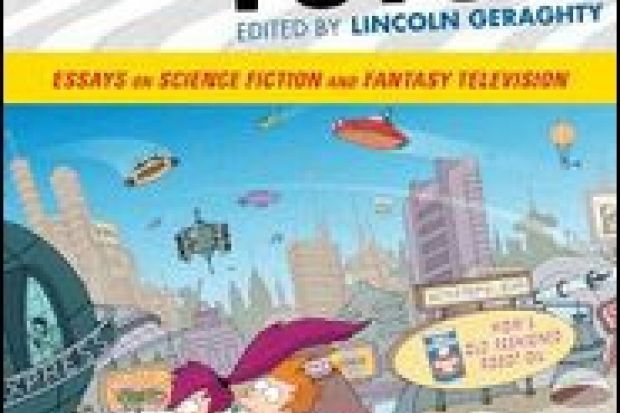You know when you have been handed an interesting book for review when it keeps disappearing and then reappearing in unexpected corners of the house without your intervention. Such was the case with Channeling the Future, which after a few weeks in my household had gathered organic annotations that reflect avid reading in culinary circumstances - stains that I suspect include marmalade and something that I sincerely hope is soy sauce.
The cover art, featuring a still from the animated series Futurama, is probably to blame. Any collection of academic writing that can legitimately use a Matt Groening creation as its defining image is likely to stand out from its fellows, as indeed this does.
Arranged in four largely self-sufficient sections, the book builds into an effective ensemble piece from the dozen or so contributing authors. The scope is grand, covering the whole of human - and alien - endeavour and many, many light years. Alternatively, you could just view it as an analysis of television "sci-fi" over the last half-century.
The term "sci-fi" is important here: it is used to distinguish action-based futuristic dramas, which are largely those considered in this collection, from their more thoughtfully derived science-fiction cousins. The pivot point between the two seems to be whether authenticity in the treatment of physical laws is considered, which I guess is as good a measure as any.
Growing up in the 1960s in a British suburban desert without the benefit of video recordings or even colour television, weekly doses of American sci-fi had an impact on me and my peers that would be hard to duplicate - or even, perhaps, fully appreciate - in the fully immersive, on-demand, digital culture of today.
As pre-teens, the fantasy games of our playgrounds were closely modelled on that week's adventure in whichever series - Lost in Space, Land of the Giants or Voyage to the Bottom of the Sea - was on the TV.
These vicarious adventures were, I believe, a significant stimulus to the imagination and development of a cohort of children who grew up to marshal the development of many of the technologies portrayed in these gung-ho speculations.
Think about the ubiquity of mobile phones today - and then recall how we envied the poise of the Men from U.N.C.L.E. as they intoned "Open channel D, please" into their fountain-pen transceivers.
These high-budget series had few competitors in the UK domestic market. Dr Who is the obvious exception, but even as ten-year-olds we grew disenchanted with the all-too-frequent appearance of the dreary gravel pit standing in for an exotic alien world - and please don't even mention Blake's 7. Just don't.
No, in live action drama, the future was American - especially when colour finally lurched gaudily on to our screens. The only British works that came close were the "Supermarionation" puppet dramas of Gerry Anderson - and even then we had to wait a long time before we saw a strong lead character with an English accent. I'll leave others to argue which particular character that was.
Within the historical accounts of these series, which feature an almost fan-like devotion to detail, are more analytical discussions regarding what the genre reveals about the culture within which it evolved. The representation of gender in sci-fi, for example, has come a long way since the women of the space-faring Robinson family were expected to take care of the laundry - even while lost in space - and discussions of more recent dramas, such as Joss Whedon's Firefly and Ron Moore's reimagining of Battlestar Galactica, which boldly re-gendered the key character of Starbuck, demonstrate this dramatically.
This is an eclectic collection that covers a lot of territory. It is an enjoyable read, and will no doubt form a valuable record of television sci-fi at what may prove to be its peak. More than that, it is genuinely thought-provoking in its discussions of what our imagined futures say about us as a society.
Channeling the Future: Essays on Science Fiction and Fantasy Television
Edited by Lincoln Geraghty. Scarecrow Press, 254pp, £.95. ISBN 9780810866751 Published 28 April 2009
Register to continue
Why register?
- Registration is free and only takes a moment
- Once registered, you can read 3 articles a month
- Sign up for our newsletter
Subscribe
Or subscribe for unlimited access to:
- Unlimited access to news, views, insights & reviews
- Digital editions
- Digital access to THE’s university and college rankings analysis
Already registered or a current subscriber? Login
